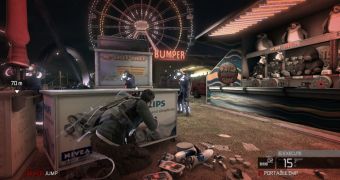One of the most disturbing things a secret operative can expect, when infiltrating a secret facility used for nefarious purposes and facing more enemy guards than he can count, is hearing his own name called out by them. I was ready to hear a conversation or two, spoken in low voices, about that terror of a man Sam Fisher and about his incredible stealth skills. But I was in no way ready to hear guards, flashlight in hand and back turned towards me, thundering, speaking to no one in particular, about their plans for me after capture and about the various other missions I've already completed in Splinter Cell: Conviction.
It takes all the realism, which is already thin on the ground to start with, out of the game. Before detection enemies seem cool headed and professional in their military fatigues, standing around chatting to each other or patrolling a perimeter around the objective. Once one of them manages to spot Sam Fisher, their whole worldview seems to turn upside down, taking their self-control with it.
Instead of advancing tactically towards the last known position of their adversary, they rush into battle, disregarding all cover. And instead of shutting up and working with hand signals or shushed commands, they get talkative, probably following a school of thought which emphasizes the psychological impact that threats and verbal abuse can have on a silent, ready to kill super agent which takes to shadows and is not above using other people as meat shields.
The childish rants from the guards would have made sense if I had been playing something like Gears of War or even, in a pinch, Modern Warfare. But Splinter Cell always took pride in having interesting conversation for Fisher to overhear while sneaking and a more realistic take on the whole concept of the super agent. People screaming at the top of their lungs while looking for the player controlled character do not advance either of the qualities mentioned above.

 14 DAY TRIAL //
14 DAY TRIAL //